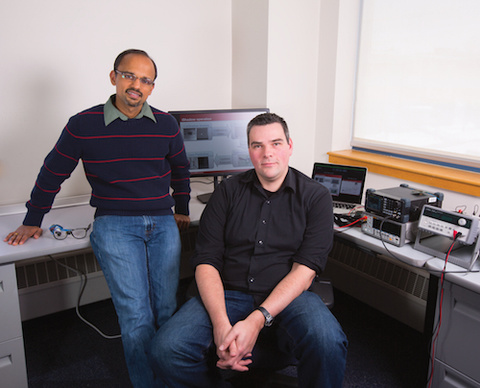Tackling digital health in the mobile domain

Digital health is a rapidly emerging area with the broad goal of improving healthcare delivery, efficiency, and quality by leveraging a diverse array of health data sources including electronic health records, medical claims data, medical imaging data, genomics data, and data streams collected from smart phones and wearable health and activity sensing devices like Fitbits and smart watches.
Within CICS, Professors Deepak Ganesan and Benjamin Marlin, and their collaborators and students, have been working on integrating advanced mobile and wearable sensing devices with state-of-the-art machine learning models and algorithms to support digital health in the mobile domain. Their work has resulted in new approaches for assessing a wide range of health and behavior-related metrics and markers from eye movements to detecting smoking, eating, and drug usage.
Marlin and Ganesan have been collaborating since 2012 when they launched an NSF-funded project to design a next-generation ultra low power wearable real-time eye gaze tracking device. Eye gaze tracking is the problem of inferring where a user is looking in a scene based on an image of their eye and an image of the scene. Ganesan and Marlin's research focuses on enabling eye gaze tracking in real time at low power on an eye glass form factor device.
The current generation of their device is based on a low-power microcontroller, a unique camera that supports random access to individual pixels, and customized neural network based algorithms that learn to optimally trade off prediction accuracy against energy use. In addition to gaze tracking, the device supports continuous computation of other eye parameters including pupil dilation, eye closures, and eye movements that are useful in health applications like continuous fatigue monitoring.
Since 2013, with funding from the National Institute on Drug Abuse, Ganesan, Marlin, and their collaborators at the Yale School of Medicine have been working on the problem of detecting drug usage events based on wireless electrocardiogram (ECG) sensors since 2013. This system aims to detect changes in the morphological structure of heartbeats caused by the presence of drugs such as cocaine. This project has led to several additional lines of research including the use of probabilistic models to more accurately infer the morphological structure of noisy ECG waveforms, as well as research into machine learning methods for mitigating the problems of between person variability and lab-to-field generalizability when models and algorithms are deployed to new populations outside of lab settings
With CICS Professor Evangelos Kalogerakis, Ganesan has also studied the use of wrist-worn smartwatches and fitness bands with inertial sensors for advanced mobile health applications. While commercial devices like Fitbits and smart watches use these sensors to infer simple metrics like steps, Ganesan has investigated their use to differentiate between different types of hand gestures linked to health-related activities including smoking and eating. This work has led to an SBIR-funded startup, Lumme Inc, which uses gesture recognition for smoking cessation.
In 2014, Ganesan, Marlin, and collaborators from eleven other sites were awarded a five-year grant from the National Institutes of Health to establish the Center of Excellence for Mobile Sensor Data to Knowledge (MD2K). Marlin leads machine learning research for MD2K, while Ganesan leads the core program on sensor device development and sensor data analytics. The center leverages, extends, and integrates mobile health (mHealth) devices, data sets, and data analysis models and algorithms developed at all of the member sites in the pursuit of two driving health problems: smoking cessation and congestive heart failure.
Since the formation of the Center, Ganesan has worked to refine the computational eye glass platform and is integrating it into the MD2K sensor suite. Marlin has worked with MD2K director Santosh Kumar's research group on machine learning models to integrate their prior work on respiration-based smoking detection with Ganesan's prior work on actigraphy-based smoking detection, resulting in a new multi-modal smoking detection system.
Currently, Ganesan, Marlin, and CICS Professor Prashant Shenoy are collaborating on the development of new research infrastructure to support mHealth technology research and development on the UMass Amherst campus. This facility, called mHealthLab, is supported by capital funds from the Massachusetts Life Science Center and is being developed as a core facility of the newly established Institute for Applied Life Sciences (see www.umass.edu/ials/). The goal of mHealthLab is to provide a state-of-the-art testbed for performing mobile health user studies and data collection involving hundreds of simultaneous users. This facility will complement ongoing research being conducted through the MD2K center and will provide a platform for interdisciplinary collaborations across campus, and with industry and government partners.